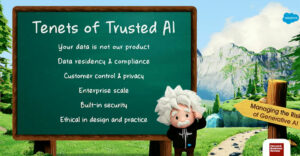There’s a changing of the guard going on in medicine that may be barely evident to most of us, but I suspect this change is simply part of the zeitgeist or tenor of the times and that nearly every aspect of our lives will be impacted by it, even in CRM.
In medicine, the talk is about a move from Medicine 2.0 to Medicine 3.0. When you go from two to three or more generally X to Y, you are working a paradigm shift. We’ve all heard of shifts in CRM before, so it won’t be too surprising to hear that another is underway, and once you consider what it portends, it will make perfect sense.
Whether medicine, CRM, or something else, the change is moving from a break-fix mentality to one more focused on root causes. What got me thinking is “Outlive: The Science and Art of Longevity” by Peter Attia, M.D.
Attia says we’re good at setting a broken bone or eliminating an infection, and we are even getting better at eliminating cancer — and for some cancers and chronic diseases like Type 2 diabetes, various interventions and drugs are giving sick people the chance to continue living a normal life. Great.
This is important because of what’s unsaid about Medicine 2.0. We ought to be able to prevent chronic diseases rather than treat them once they’re full-blown. Treating a broken bone makes sense, and accidents will happen. You can wear a bike helmet or a seatbelt, but there will always be a need for Medicine 2.0. But many chronic diseases can best be treated by eliminating root causes; that’s Medicine 3.0.
Unintended Consequences of CRM 2.0
In CRM today, we work with a 2.0 mentality, not always, but mostly. We look for ways to lower churn and boost retention, which is good. However, too often, we use CRM to short-circuit customer issues. For instance, I have noticed a disturbing trend of using our technologies to rebuff customers who want something that is not strictly vanilla.
Even before AI gets into the mix, we’re doing a good job of pushing customers back to the website where help is not available or stranding them on the phone. We’re also surveying customers, but my experience is that bad reviews aren’t followed up.
I’ve recently discovered that it is impossible to cancel certain subscriptions unless I complain to the credit card company, which then claws back a payment that a vendor prevented me from canceling. Maybe you’ve noticed that car vendors jack prices up beyond MSRP, and nearly every vendor forgets to return calls that might threaten their bottom lines.
Salesforce’s Push for Ethical CRM
To get to a CRM 3.0 equivalent, we need a more ethical CRM culture, and Salesforce is in the early stages of promoting one.
Salesforce sees three main axes that they attribute to customer health, including product adoption, expertise, and technical health, and their great innovation is breaking these areas down for the purposes of scoring them on a scale of 10. Salesforce introduced this approach at Dreamforce, and the company is now proselytizing and adding detail.
Adoption means more than just getting an enterprise license. Are people using the products? At a base level, can you still get a benefit if half your sales team is still clinging to spreadsheets?
Expertise goes to the skill with which your people use the apps and how well your admins can use the tools to generate reports, add fields, and generally change the functionality to support the business best, not once but continually. In short, is everyone trained?
Finally, technical health means many things. Fundamentally, how well-optimized is your implementation? Sometimes, we use a tool in a suboptimal way. For instance, a bottle opener might be an adequate screwdriver in a pinch, but you wouldn’t want your whole organization using such a kludge. That’s why periodic technology audits are a good idea. They help ensure you’re doing the right thing the right way.
CRM plays a role in much of bad 2.0 behavior at a time when we crave 3.0 vendor relationships. Don’t expect AI to solve this problem. As some of my colleagues say, AI is a tool that can be used for good or bad.
Transitioning to CRM 3.0
Simply put, I think getting to CRM 3.0 will require a new infusion of ethics into business. CRM vendors, like Salesforce, are trying to instill the idea, and I hope they keep making progress.
Perhaps an ethics module will become part of Trailhead, or an ethics movement that mirrors the 1-1-1 philanthropy model will take hold.
In a world of increasing commodification of basic technology, a pledge to be ethical might sway purchase decisions.
























































